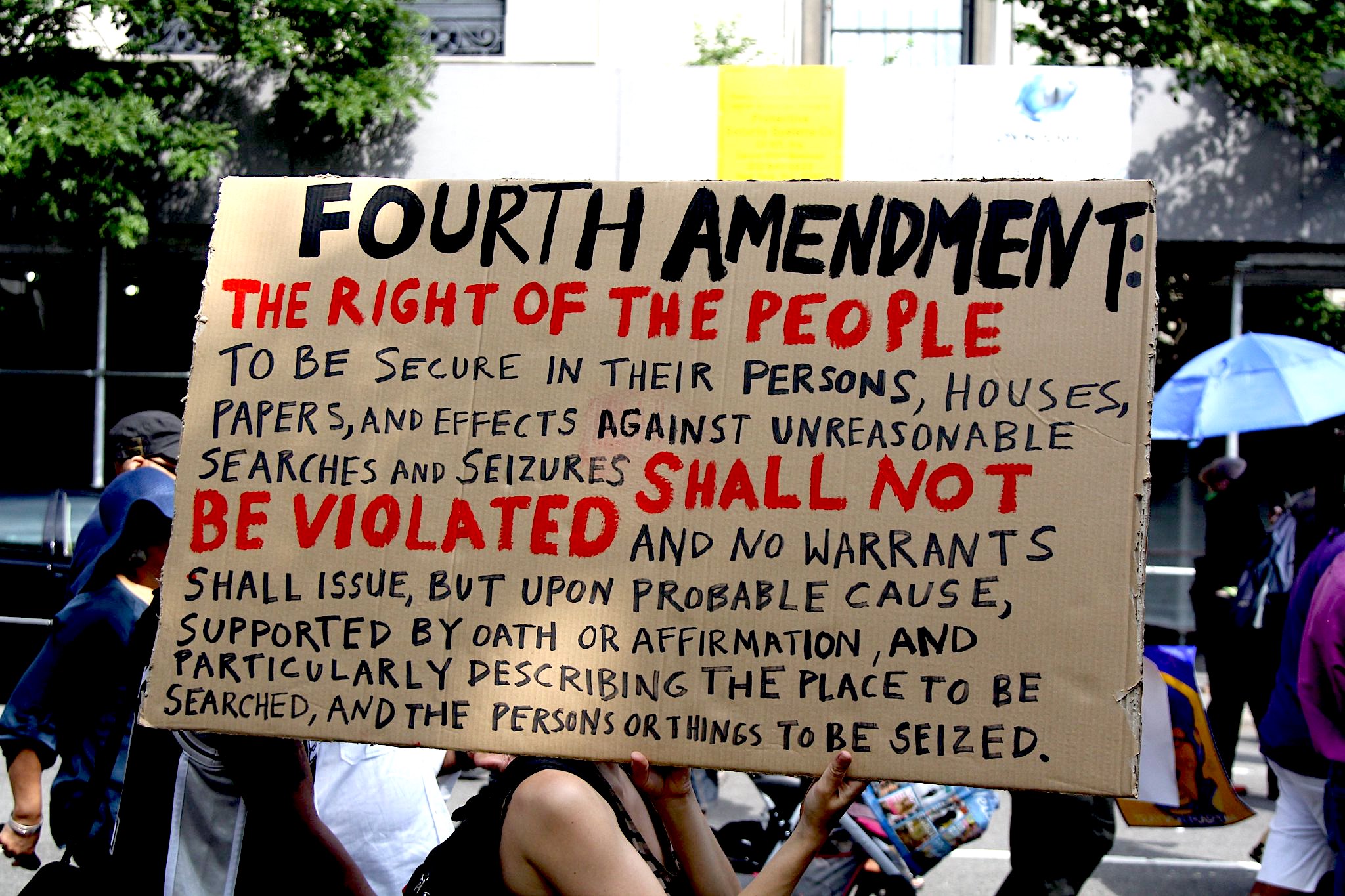Andrew P. Napolitano on Tulsi Gabbard’s abandonment of the people’s constitutional protection from spying under the Fourth Amendment.

U.S. Congresswoman Tulsi Gabbard in Des Moines, Iowa, in August 2019. (Gage Skidmore, Flickr, CC BY-ND 2.0)
 When she was a member of the House of Representatives, Tulsi Gabbard was a fierce defender of personal privacy rights protected by the Fourth Amendment.
When she was a member of the House of Representatives, Tulsi Gabbard was a fierce defender of personal privacy rights protected by the Fourth Amendment.
She consistently opposed permitting federal agents to spy on Americans without search warrants, and she consistently voted against the reauthorization of Section 702 of the Foreign Intelligence Surveillance Act of 1978.
Last week, Gabbard, now about to be nominated as director of national intelligence — the head of all known American spying agencies — changed her mind on Section 702 and no longer believes that the Constitution means what it says.
Here is the backstory.
After the resignation of President Richard Nixon in 1974 and the full extent of his use of the F.B.I. and the C.I.A. for domestic warrantless surveillance became known, Congress enacted Foreign Intelligence Surveillance Act (FISA).
It proclaims itself to have established the only lawful method for surveillance outside of the Fourth Amendment. This proclamation is itself a profound constitutional error, as ALL surveillance in defiance of the Fourth Amendment is unconstitutional.
That amendment was written in the aftermath of British agents executing general warrants on the colonists. General warrants were not based on probable cause of crime, but rather governmental need. And they did not specifically describe the place to be searched or the person or thing to be seized.
Rather, general warrants — issued by a secret court in London — authorized the bearer in America to search wherever he wished and seize whatever he found. The agents ostensibly were looking for proof of tax payments. They were really engaged in spying. They were looking for subversive, revolutionary materials.
After the Revolutionary War was won and the Constitution was ratified, the Bill of Rights was ratified. The Fourth Amendment in the Bill of Rights protects all “people” from unreasonable searches and seizures by the government — both law enforcement and spies. The courts have interpreted “unreasonable” to mean “without a search warrant.”
The Supreme Court has characterized spying as surveillance and surveillance as a search under the Fourth Amendment. That amendment requires search warrants issued by judges and based upon probable cause of crime demonstrated to the judges under oath and specifically describing the place to be searched or thing to be seized for the surveillance — the spying — to be lawful.
Please Support CN’s
Winter Fund Drive!![]()
The amendment’s drafters’ intentional employment of the word “people” makes it obvious that the amendment protects every person from every search and every seizure by anyone from the government without a warrant. It is not limited to Americans or adults or good people or people the government likes; rather, it protects all people.
In a linguistic effort to accommodate the warrant requirement and its probable cause pre-condition, the congressional drafters of FISA required that the FISA Court may issue warrants for surveillance based on probable cause not of crime but of being a foreign government agent.
The FISA Court then, on its own, morphed foreign agency into foreign personhood and then morphed that into communicating with a foreign person.
So, if you text or email or call your cousin in Geneva or an art dealer in Florence, you become a target for a FISA surveillance warrant — merely by communicating with a foreign person.
Even this loosening of Fourth Amendment protection by the Orwellian re-definition of probable cause was not enough to satisfy the rapacious appetite of the government to spy.
Thus, President George W. Bush ordered the National Security Agency — the federal government’s 60,000-person strong cadre of domestic spies in the Department of Defense, and thus subject directly to the president — to engage in warrantless spying, in defiance of FISA, and on a scale vastly greater than that which Nixon had ordered of the F.B.I. and C.I.A. in the 1970s.
Direct Affront to Fourth Amendment

Demonstration in New York City against the police racial profiling practice known as Stop and Frisk, June 2012. (Terence McCormack, Flickr, CC BY-NC-ND 2.0)
When Congress learned in 2008 of the warrantless spying through the reporting of The New York Times rather than defunding it, it enacted Section 702 as an exception to FISA, and thereby made warrantless spying on foreign persons in America legal.
In a direct affront to the Fourth Amendment, Section 702 permits the NSA and its cousins in the 16 other federal spying agencies to spy without warrants on all communications involving foreign persons.
What happens when a foreign person communicates with an American?
Section 702 permits warrantless surveillance of Americans who communicate with foreign persons, permits the NSA to maintain a database of all such American persons, permits the F.B.I. to search those databases without a search warrant and, if the NSA learns of evidence of criminal behavior without a warrant, requires it to share that evidence with the F.B.I.
It gets worse.
Since Department of Justice lawyers have persuaded the FISA Court to issue warrants to spy on Americans who communicate with foreigners out to the sixth degree of communication, the NSA has contended that Section 702 also permits it to spy out to the sixth degree.
How many persons can be spied upon under the NSA’s interpretation of 702?
Call your cousin in Geneva and NSA can spy on everyone with whom you speak and everyone to whom they speak and so on, out to the sixth level of communication.
The F.B.I. reported that in 2021, it searched 3.4 million names in the NSA database of Americans who communicated with foreigners. If you take those 3.4 million out to the sixth degree of their American communications, the number grows exponentially.
You will have reached 330 million Americans before completion of the process.
In order to win the votes of Republican senators who hate the Fourth Amendment, Gabbard has told them she now favors Section 702 warrantless spying.
This is the very same Section 702 used to justify spying on Donald Trump before his election in 2016 and during his first term as president.
Gabbard apparently covets her new job more than she covets her principles. Of what value is the Constitution if federal officials abandon it?
Andrew P. Napolitano, a former judge of the Superior Court of New Jersey, was the senior judicial analyst at Fox News Channel and hosts the podcast Judging Freedom. Judge Napolitano has written seven books on the U.S. Constitution. The most recent is Suicide Pact: The Radical Expansion of Presidential Powers and the Lethal Threat to American Liberty. To learn more about Judge Andrew Napolitano, visit https://JudgeNap.com.
Published by permission of the author.
COPYRIGHT 2024 ANDREW P. NAPOLITANO
DISTRIBUTED BY CREATORS.COM
The views expressed are solely those of the author and may or may not reflect those of Consortium News.
Please Support CN’s
Winter Fund Drive!![]()
Make a tax-deductible donation securely by credit card or check by clicking the red button:


Shocked! A politician spreading her knees at the first smell of money!
Ever wonder why Trump reached out to Marco Rubio to lead STATE in Trump’s show Revolution? At least it was clear from the beginning that his main role in America First is to turn the handle on the barbie of the Venezuelan Roast to liberate all the heavy oil that is rightfully ours. Unless the Marines perform with the level of proficiency they have displayed in the other wars they have started.
There is a saying in Romania that politics is the second oldest job in the world; the first oldest job being prostitution.
Tulsi Gabbard is the living proof of this.
Just think what degree of separation could be achieved in checking someones security clearance and perhaps keeping a database?
Even our Libertarian judge underestimates and obscures the importance of the Bill of Rights.
When he says that it is in the Constitution, he is correct only in so far as he means the current Constitution as it was approved by the American people. When the American people saw the Constitution without the Bill of Rights, forming a central government that they feared would get out of control with no guarantees of rights or liberties… the American people said No. Under the rules of that era, 9 out of 13 had to agree, they only got 8.
The deal that got the Constitution approved included adding the Bill of Rights. So, when the question was the formation of this government without the Bill of Rights, this was rejected by the American people. The people only approved the Constitution with the Bill of Rights amended to it.
The Bill of Rights was thus make or break to the Constitution and this government. This government only exists because it was willing to recognize the Bill of Rights.
Which by the way includes not only a right to be secure in our papers (in a pre-electronic age) but also contains a catch-all amendment (9 I believe, if not 10) which says that just because the free people of America have insisted upon listing out the above rights, this does not mean they give up all other rights, and instead declares quite clearly that they are also retained by the free people of America. This of course includes the obvious right to privacy long denied by conservative judges.
And it’s important to note that the “government” gave very little notice for people to get to towns in time to vote for or against the Bill of Rights. If there had been proper notification with enough time, it’s likely the Bill of Rights would have been voted down as being too restrictive.
Tulsi Gabbard has turned out to be such a disappointment. Like most all politicians she has a price too.
yes. The good thing for me is that perhaps the old Tulsi sticker on my car might help protect it in my maga rural county. :)
But, it does make one wonder what was true? What was real? I thought she seemed sincere before. I’m sure Trump thinks she’s sincere now. Is either true? In older times, some wiser leaders shied away from using people who had switched sides. One could not really be sure whose side they were on. Today? Or in the future? But then again, the word “wise” and Donald Trump are never used together. And we know from Trump I that we should probably say “Trump’s First National Intelligence Director” as Trump’s second favorite words after “raise taxes” are “you’re fired!”
Either way, I nominate Tulsi for a 2024 Al Gore Award for “re-inventing” herself.
Isn’t it called simply “opportunism.?” I’m surprised that so many are surprised about Ms. Gabbard. As for opportunism, when you have the majority of Congress standing clapping wildly for that profoundly malevolent and criminal Netanyahu, and seemingly upstanding Senators like Cantwell and Murray from WA State voting $8 billion here and as much there for that malevolent and criminal Netanyahu’s genocide, one marvels how very very few Congressional persons there are who are not swollen with the fever to drop AIPAC’s and its various look alikes’s money into their own campaign pockets. In the case of the Washington senators, that includes that ignoble Boeing Corporation.”Coming in at No. 88 on the list, Boeing has a “poor” reputation rating due to its low scores on the dimensions of “trust,” “citizenship” and “character.” (Axios.com) Wow! But ehh, who cares about character when you can git that cash!!!!
Boeings (the ‘s’ is a colloquialism; I’m 5th generation western WA) was well run, if a little stodgy, because engineers were trained and promoted into management. Then mgt. was moved to Chicago, which pushed them away from the local foundation and identity. Worst of all, mgt. fell into the hands of finance types. Same sort as those now dominating the entire econ system, the ones focussed on manipulating money for immediate profit…especially their own. No need to know how to actually make anything, so no need to listen to line workers or even to quality inspectors. Of course it didn’t hurt that for decades WA had the powerful, experienced U.S. Senators Magnuson and Jackson. Magnuson was old school New Deal; he cared about the majority working class. Jackson for sure was a hawk, but pro Cold War and Vietnam war meant lots of $$$ going to the BAC.
Yes, and remember that Gabbard condemned Israel a few years ago when it was politically safe to do so. Now, she’s down with Israel, which means she’s down with Genocide. And in Washington that’s the “safe” position.
My only question is: When was she recruited? Before joining up? After joining up? And her “criticism” of Israel may have been part of the ploy.
She was NEVER sincere. The signs were there of her authoritarian inclinations, but you overlooked them, perhaps in hope that this nice-looking woman (and her looks and youth absolutely can’t be discounted here), was the Real Deal. But watch her little concession video from 2020, in which she throws her allegiance to Biden. I would have thought that groveling, utterly boot- licking performance would finally convince most everyone of her fraudulence, but no. Steel youself for when she runs for President in four or eight years, and do not forget what she’s about!
It’s time for a new constitution.
It’s time for a new Revolution. Revolution means “turning”.